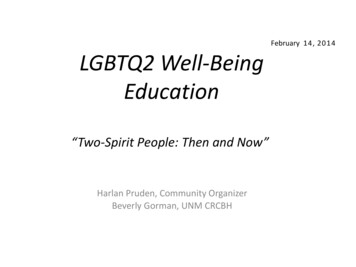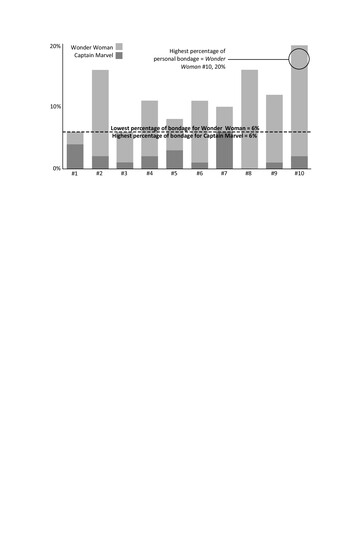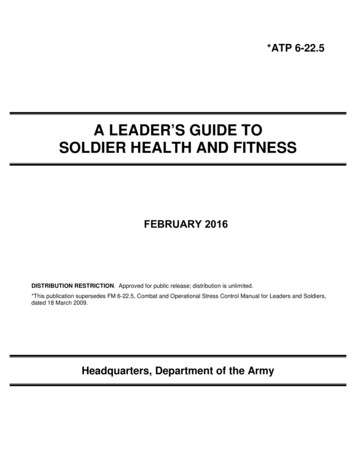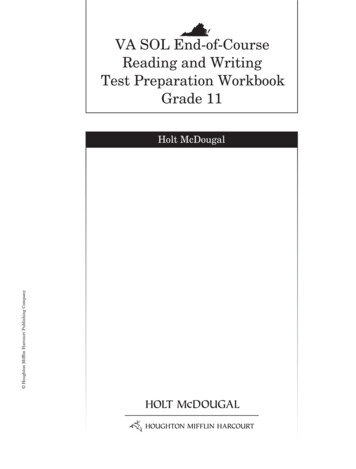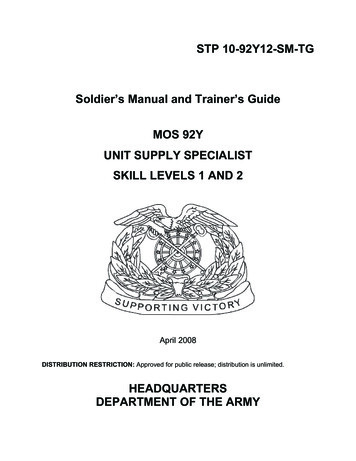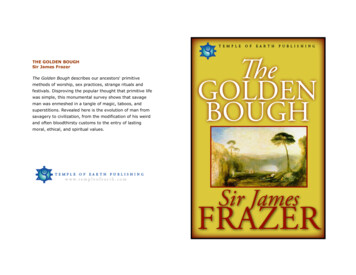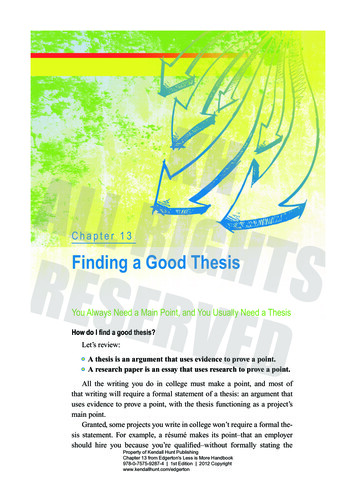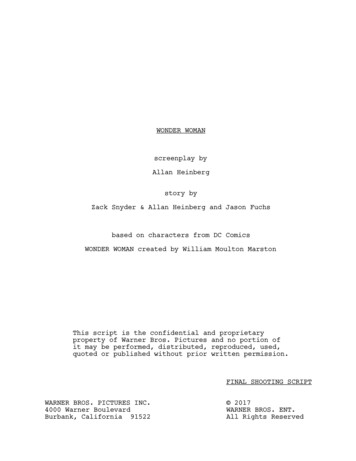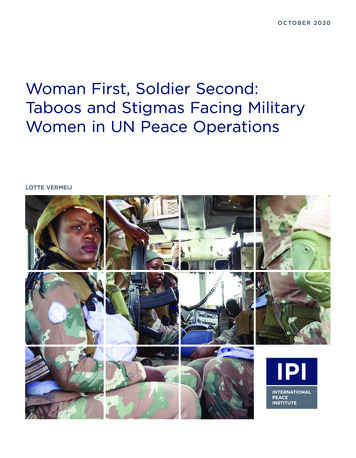
Transcription
O C TO B E R 2 02 0Woman First, Soldier Second:Taboos and Stigmas Facing MilitaryWomen in UN Peace OperationsLOTTE VERMEIJ
Cover Photo: Female peacekeepersfrom South Africa on a MONUSCOpatrol in Beni, Democratic Republic ofthe Congo, 2018, MONUSCO.Disclaimer: The views expressed in thispaper represent those of the authorand not necessarily those of theInternational Peace Institute. IPIwelcomes consideration of a widerange of perspectives in the pursuit ofa well-informed debate on criticalpolicies and issues in internationalaffairs.IPI PublicationsAdam Lupel, Vice PresidentAlbert Trithart, Editor and ResearchFellowMeredith Harris, Editorial InternSuggested Citation:Lotte Vermeij, “Woman First, SoldierSecond: Taboos and Stigmas FacingMilitary Women in UN Peace Operations,”International Peace Institute, October2020. by International Peace Institute, 2020All Rights Reservedwww.ipinst.orgABOUT THE AUTHORDr. LOTTE VERMEIJ is a Senior Advisor to the NorwegianArmed Forces. She previously served as a WomenProtection Advisor in the UN Organization StabilizationMission in the Democratic Republic of the Congo(MONUSCO) and worked as a Senior Research Fellow andHead of the Peace Capacities Programme at theNorwegian Institute of International Affairs (NUPI).ACKNOWLEDGEMENTSThe author wishes to thank all 142 military women fromfifty-three countries who generously contributed to thisstudy by sharing their insights and experiences in personalinterviews. She would also like to thank all the militarywomen, UN officials, and member-state representativeswho shared their views at meetings and events in NewYork, including a roundtable on taboos and stigmas facingmilitary women held at IPI in February 2020.The author would like to thank all the reviewers whoprovided valuable advice and comments on drafts of thispaper, including Gretchen Baldwin, Major General PatrickCammaert, Pablo Castillo Díaz, Phoebe Donnelly, DanielForti, and Kari Osland. The author is particularly grateful toall the military women who provided invaluable advice andfeedback throughout the research process, including MajorShajeda Akter Moni, Commander Marcia Andrade Braga,Captain Cleo Bigwood, Major Sophie Bosdotter, ColonelIrena Dzisiewska, Lieutenant Colonel Christine Heggli, MajorKristy Hudson, Wing Commander Llani Kennealy, MajorGeneral Kristin Lund, Commander Carla Monteiro de CastroAraujo, Lieutenant Colonel Gladys Ngondo, Major GeneralCheryl Pearce, Major Nadia Riffi, Lieutenant ColonelMosima Setle-Sepeng, and all the other military womenwho reviewed this paper and chose to remain anonymous.Thank you to Albert Trithart and Meredith Harris at IPI fortheir excellent editing assistance.IPI owes a debt of gratitude to its many generous donors,whose support makes publications like this one possible.This paper is part of IPI’s Women in Peace OperationsProject, which is supported by the government of Canada.
CONTENTSAbbreviations . . . . . . . . . . . . . . . . . . . . . . . . . . . . . . . . . . . . . . . . . . . . . . . . . . . iiiExecutive Summary . . . . . . . . . . . . . . . . . . . . . . . . . . . . . . . . . . . . . . . . . . . . . . vIntroduction. . . . . . . . . . . . . . . . . . . . . . . . . . . . . . . . . . . . . . . . . . . . . . . . . . . . . . 1Taboos and Stigmas Facing Military Women . . . . . . . . . . . . . . . . . . . . . . . . 2Taboos and Stigmas Facing Military Womenat the Individual and Community Levels . . . . . . . . . . . . . . . . . . . . . . . . . . . . 2Taboos and Stigmas Facing Military Womenwithin National Defense Structures . . . . . . . . . . . . . . . . . . . . . . . . . . . . . . . . 5Taboos and Stigmas Facing Military Womenin UN Peace Operations . . . . . . . . . . . . . . . . . . . . . . . . . . . . . . . . . . . . . . . . . . 13Mitigation Strategies and Support Structures . . . . . . . . . . . . . . . . . . . . . . . 18Mitigation Strategies . . . . . . . . . . . . . . . . . . . . . . . . . . . . . . . . . . . . . . . . . . . . . 18Support Structures. . . . . . . . . . . . . . . . . . . . . . . . . . . . . . . . . . . . . . . . . . . . . . 20Conclusions and Recommendations. . . . . . . . . . . . . . . . . . . . . . . . . . . . . . . 24Recommendations for National Defense Structures . . . . . . . . . . . . . . . . 25Recommendations for the UN Department ofPeace Operations . . . . . . . . . . . . . . . . . . . . . . . . . . . . . . . . . . . . . . . . . . . . . . . 27Recommendations for Future Research. . . . . . . . . . . . . . . . . . . . . . . . . . . . 31Annex: Interview and Data Findings . . . . . . . . . . . . . . . . . . . . . . . . . . . . . . . 32
ABBREVIATIONSAUAfrican UnionDPOUN Department of Peace OperationsFMOCFemale Military Officers CourseLGBTILesbian, gay, bisexual, transgender, and intersexMINURSOUN Mission for the Referendum in Western SaharaMINUSCAUN Multidimensional Integrated Stabilization Missionin the Central African RepublicMINUSMAUN Multidimensional Integrated Stabilization Missionin MaliMONUSCOUN Organization Stabilization Mission in theDemocratic Republic of the CongoOMAUN DPO’s Office of Military AffairsUNAMIDUN–African Union Mission in DarfurUNDOFUN Disengagement Observer ForceUNFICYPUN Peacekeeping Force in CyprusUNIFILUN Interim Force in LebanonUNMISSUN Mission in South SudanUNMOGIPUN Military Observer Group in India and PakistanUNTSOUN Truce Supervision OrganizationTCCTroop-contributing country
Executive SummaryDespite efforts to increase the participation ofwomen uniformed peacekeepers, military womencontinue to face taboos and stigmas that arebarriers to their inclusion and successful deployment. The taboos and stigmas military women faceare strikingly similar, regardless of their nationality, rank, or religion. Nonetheless, the extent towhich they experience these taboos and stigmas islinked to cultural, professional, and personalfactors. Some women are also disproportionatelyaffected by these taboos and stigmas because oftheir ability, appearance, education, race, orsexuality.Taboos and stigmas facing military women can beassessed at three levels: (1) at the individual andcommunity levels; (2) within their national defensestructures; and (3) during deployment to UN peaceoperations. At the individual and communitylevels, military women are often seen as lessfeminine and less marriageable. Single women maybe seen as promiscuous, while mothers are oftenperceived as neglecting their families.Within national defense structures, women’spresence, appearance, and performance areassessed with greater scrutiny. Many feel that theyare treated as a woman first and a soldier second;they are seen as weaker and in need of protection.Military women also often face hostility fromcolleagues who see them as receiving extra support.But at the same time, they face barriers in theircareers due to the assumption that they will alwaysprioritize their family over the military. One of thebiggest challenges military women face is the tabooaround speaking out over sexualized and discriminatory behavior. It is also taboo for women tospeak about the inadequacy of military equipmentthat is designed for men.Military women deployed to UN peace operationsface an added layer of taboos and stigmas. Theperceived lack of accountability in peace operationsallows discrimination, inappropriate behavior, andsexual harassment and assault to flourish. In peaceoperations’ multicultural environment, womenalso frequently encounter men who do not acceptwomen’s leadership due to deep-rooted customs,beliefs, or mindsets. Moreover, there is a tendencyto put women in “traditionally female” roles relatedto gender and protection, regardless of theirqualifications. These challenges are all exacerbatedfor women of color.Military women use a range of strategies to mitigatethese taboos and stigmas, including sharinginformation with their family and friends, workingharder to prove themselves, and avoiding certainsituations. They also turn to informal and formalsupport structures, though most of these fall short,especially when it comes to addressing discriminatory and sexualized behavior.To increase the pool of available, qualified femalesoldiers and officers and to enable them to successfully deploy to UN peace operations, both troopcontributing countries and the UN need to targetthe root causes and impact of the taboos andstigmas military women face. This requires directand sustained involvement and commitment byleaders in the UN and national governments. It alsorequires hearing, including, and acting on thevoices and recommendations of military womenthemselves, including the following: National defense structures should improvestandards of behavior and accountability,educate men and women on taboos and stigmas,recruit and retain more women, proactivelyreach out to and select women for deployment topeace operations, provide women the supportthey need, and design equipment that better suitswomen’s needs. The UN Department of Peace Operations shouldstrengthen narratives on the importance offemale peacekeepers, ensure all peacekeepersrespect UN values, develop mission-specificgender strategies and plans, engage more firmlywith troop-contributing countries, make recruitment and selection processes more gendersensitive, hold personnel accountable fordiscriminatory and sexualized behavior, andestablish in-mission support systems.
Woman First, Soldier Second: Taboos and Stigmas Facing Military Women in UN Peace OperationsIntroductionTaboos and stigmas significantly impact thedeployment of military women to UN peaceoperations.1 Despite efforts to increase the participation of women uniformed peacekeepers, militarywomen continue to face taboos and stigmas thatare barriers to their inclusion and successfuldeployment.2 Being confronted with persistenttaboos and stigmas on the individual andcommunity levels, as well as within nationaldefense structures and UN peace operations, canhave far-reaching consequences for militarywomen before, during, and after deployment.One military woman deployedMultidimensional IntegratedStabilization Mission in theCentral African Republic(MINUSCA) described theenvironment many militarywomen face in UN peaceoperations:to the UN1the mission than outside. The lack of authorityand women being a minority within the forcemade it very difficult to report and addressthese issues. Women who did speak up wereoften discouraged from making officialcomplaints and were sometimes even bulliedand isolated.This paper discusses how experiences like this affectmilitary women across all ranks, roles, and nationalities and perpetuate the underrepresentation ofwomen military peacekeepers in UN peaceoperations. Compared to the civilian and policecomponents of UN peace operations, the militarycomponent struggles the most to increase theparticipation of women.This underrepresentation hasbeen an ongoing challenge forthe UN due to a combinationof factors, including a lack ofpolitical will, inadequatefinancing and accountability,and resistance to genderequality.3 Core to thisimbalance are “external challenges stemming frompolicies and practices of Member States, as well asinternal challenges within the UN Secretariat’scontrol.”4 These include challenges related toselection for deployment and negative deploymentexperiences, as well as household-level constraints.5Social norms and biases reinforce these challengesby perpetuating gender inequality within nationaldefense structures in general.6Despite efforts to increase theparticipation of women uniformedpeacekeepers, military womencontinue to face taboos and stigmasthat are barriers to their inclusionand successful deployment.Despite the fact that I amused to the dynamics of a male-dominatedenvironment through my national defenseforce, the sexism, shaming, and harassment ofmilitary women I witnessed and experiencedin-mission went beyond any of my expectations. [While] some colleagues were verysupportive, I was made to feel like a badmother, my decisions were questioned andignored on several occasions, and I witnessedmultiple cases of inappropriate behavior thatmade me feel more unsafe within the “walls” ofThis paper adds to earlier studies on logistical1 Taboos refer to social or religious factors that create external perceptions of women that may lead to them avoiding deployment to peace operations. Stigmas referto societal disapproval of women deploying to peace operations. When women do deploy, this may lead to them facing a lack of respect or negative opinionsbecause they have done something society does not approve of.2 Over the past two decades, the UN has sought to increase the number of women uniformed peacekeepers deploying to UN peace operations. Building on UNSecurity Council Resolution 1325 and the ten subsequent Security Council resolutions on women, peace, and security, a number of initiatives have beenundertaken to address the gender imbalance in UN peace operations. Recent examples include the Action for Peacekeeping initiative’s “Declaration of SharedCommitments on UN Peacekeeping Operations” and the UN Uniformed Gender Parity Strategy 2018–2028. UN leadership has reinforced these initiatives byemphasizing the importance of increasing the number of uniformed women in UN peace operations during countless strategic engagements. See, for example:Secretary-General António Guterres’s statement during the commemoration of the 2020 International Day of United Nations Peacekeepers. UN Secretary-General,“UN Secretary-General Remarks at the Gender Advocate Award and Dag Hammarskjöld Medal Ceremony,” New York, May 29, 2020. Furthermore, UN SecurityCouncil Resolution 2538 was adopted in August 2020 as a call to strengthen the collective efforts of the UN Secretariat, member states, and regional organizationsto achieve women’s full, effective, and meaningful participation in peacekeeping at all levels and in all positions. See: UN Security Council Resolution 1325(October 20, 2000), UN Doc. S/RES/1325; and UN Security Council Resolution 2538 (August 28, 2020), UN Doc. S/RES.2538.3 Gretchen Baldwin and Sarah Taylor, “Uniformed Women in Peace Operations,” International Peace Institute, June 2020; and Kari M. Osland, Jenny Nortvedt, andMaria Gillen Røysamb, “Unity in Goals, Diversity in Means—and the Discourse on Female Peacekeepers in UN Peace Operations,” Norwegian Institute ofInternational Affairs (NUPI), June 2020.4 UN Department of Peace Operations (DPO), “Uniformed Gender Parity Strategy 2018–2028.”5 Marta Ghittoni, Léa Lehouck, and Callum Watson, “Elsie Initiative for Women in Peace Operations: Baseline Study,” Geneva Centre for Security SectorGovernance, 2018.6 Sahana Dharmapuri, “Not Just a Numbers Game: Increasing Women’s Participation in UN Peacekeeping,” International Peace Institute, July 2013.
2barriers by focusing on taboos and stigmas as keybarriers to women’s deployment to UN peaceoperations.7 The author interviewed 142 militarywomen from fifty-three countries around the worldfor this study (see Annex).8 To assess how ranksand roles affected their experiences, these includedwomen in ranks ranging from private to majorgeneral and who had previously been or werecurrently deployed to UN peace operations ascontingent members, military observers, staffofficers, or senior mission leaders.9 The author alsohad extensive conversations with member-staterepresentatives and military women serving as UNofficials at UN headquarters or who had deployedto non-UN operations, including for the AfricanUnion (AU) and NATO.This paper examines taboos and stigmas thatimpact military women at three levels: (1) at theindividual and community levels; (2) within theirnational defense structures before deployment toUN peace operations; and (3) during deploymentto UN peace operations. Analyzing each of theselevels separately allows for a clearer identificationof areas that need to be addressed by troopcontributing countries (TCCs) and the UNDepartment of Peace Operations (DPO). Reflectingthe voices and perspectives of military womenaround the world, the paper discusses taboos andstigmas in detail and highlights strategies militarywomen use to address these prior to and duringtheir deployment. It also provides an overview offormal and informal support structures available tomilitary women. It concludes with actionablerecommendations for national defense structuresand DPO on how to overcome these taboos andstigmas and the barriers to deployment they create,as well as suggestions for future research.78Lotte VermeijTaboos and Stigmas FacingMilitary WomenMilitary women experience striking similarities inthe taboos and stigmas they face, regardless of theirnationality, rank, or religion. Nonetheless, theextent to which they experience these taboos andstigmas is linked to cultural, professional, andpersonal factors, as well as the percentage ofwomen within their national defense structure,specific service, and role. Some women are alsodisproportionately affected by these taboos andstigmas because of their ability, appearance,education, race, or sexuality. This section describesthe taboos and stigmas military women face at theindividual and community levels, within theirnational defense forces before deployment to UNpeace operations, and during deployment to UNpeace operations.Taboos and Stigmas FacingMilitary Women at the Individualand Community LevelsMilitary women from all over the world experiencetaboos and stigmas at the individual andcommunity levels, particularly when they considerdeploying or have deployed to UN peaceoperations or other international operations.10Nonetheless, the extent to which they face taboosand stigmas within their communities varies basedon context-specific cultural dynamics and expectations.Societal Perceptions of Military WomenOne of the most common and sustained stigmasattached to women in the military is the perceptionSee, for example: Ghittoni, Lehouck, and Watson, “Elsie Initiative for Women in Peace Operations: Baseline Study.”These countries include Australia, Bangladesh, Brazil, Burkina Faso, Cambodia, Canada, Chad, Chile, Egypt, Fiji, Finland, France, the Gambia, Germany, Ghana,Greece, India, Indonesia, Ireland, Jordan, Kenya, Liberia, Malawi, Malaysia, Mexico, Moldova, Morocco, Nepal, the Netherlands, New Zealand, Niger, Nigeria,Norway, Pakistan, Peru, Poland, Romania, Russia, Rwanda, Senegal, Sierra Leone, South Africa, Sri Lanka, Sweden, Switzerland, Thailand, Togo, Tunisia, Ukraine,the United Kingdom, the United States, Uruguay, and Zambia. The participants are currently or have been deployed to the following UN missions: the UNMission for the Referendum in Western Sahara (MINURSO), UN Multidimensional Stabilization Mission in the Central African Republic (MINUSCA), UNMultidimensional Integrated Stabilization Mission in Mali (MINUSMA), UN Organization Stabilization Mission in the Democratic Republic of the Congo(MONUSCO), UN–African Union Mission in Darfur (UNAMID), UN Disengagement Observer Force (UNDOF), UN Military Observer Group in India andPakistan (UNMOGIP), UN Peacekeeping Force in Cyprus (UNFICYP), UN Interim Force in Lebanon (UNIFIL), UN Truce Supervision Office (UNTSO), andUN Mission in South Sudan (UNMISS).9 The percentage of female peacekeepers in UN peace operations is small, and military women who deploy to these missions are a small community. Due to thehighly sensitive nature of the content of the interviews conducted for this study, the author has done everything in her power to de-identify the interviewees.Disclosing the process through which interviewees were identified for this study would compromise the anonymity of the participants. For the safety of all womenparticipating in this study, their anecdotes are linked to the UN peace operation they deployed to instead of their nationality.10 When speaking about taboos and stigmas faced on the individual and community levels, women referred to issues they experienced in private settings or at home.These taboos and stigmas might have been held by family and friends, as well as by their cultural and religious communities.
Woman First, Soldier Second: Taboos and Stigmas Facing Military Women in UN Peace Operationsthat they are more man-like and less feminine thancivilian women. “Communities see us as masculine,angry, and more aggressive than ‘normal’ women,as we are trying to fit in with a male-dominatedculture,” said a woman deployed to the UNMultidimensional Integrated Stabilization Missionin the Central African Republic (MINUSCA).At the same time, most women who had deployedto UN peace operations noted that their communities were genuinely concerned for their well-beingwhile they were on mission. As one woman whohad deployed to the UN Truce Supervision Office(UNTSO) said, “Our communities tend to bubblewrap military women. We are well-trained soldiersand we are not fragile, but they still worry about usgoing on deployments because women are seen asthe weaker sex.” Additionally, a woman deployedto the UN Organization Stabilization Mission inthe Democratic Republic of the Congo(MONUSCO) explained,I come from a military family, and they werevery supportive about my deployment; theysaw it as something natural. However, myfriends and neighbors were surprised and saidit was a bad idea for a woman to leave her lovedones and the comforts of home to go onmission in a foreign country. They tried todiscourage me by degrading my courage,strength, and capacity and said, “It is not awoman’s job”; “War is not for women”; “Theywill rape you”; “They will hurt you”; and “Youare too beautiful to go to those places.”Due to these perceptions, 108 out of 142 womeninterviewed said they often felt misunderstood andhad to make a conscious effort to engage with theircommunities to try to correct these stereotypes.11Many women did not feel supported in leaving, andsome even felt they had to justify their choice totheir community. This erodes women’s supportstructures at home. Many did not feel they wereable to talk to their community about thechallenges they faced in-mission because they hadto reassure them about their deployment in the firstplace. These women were forced to find their ownsolutions to their problems.3In most cultures, military women are expected tofill traditional gender roles such as taking care ofthe family and running the household. In manycases, these expectations, along with overt orunconscious biases, lead to communities shamingmilitary women. Several women said that thisshaming increased when they deployed to UNpeace operations or other international operations,as “going away for an extended period of time fallsoutside of the general expectations of how a womanis supposed to behave and the role she is supposedto play within her community.”12 Single womenoften face cultural and societal expectations tosettle down and start a family and are questionedabout their decision to instead focus on theircareer. These cultural and societal expectations aredeeply heteronormative, and interviews indicatedthat queer military women are disproportionallyaffected by these stigmas.Stereotypes Related to Women’sSexualityTaboos around being a woman in the military areoften linked to stereotypes about women’ssexuality. As a military woman deployed toMONUSCO said, “When I went to the militaryacademy, the comments around my decision weremostly based on wondering whether I was crazy, orif I was trying to impress someone. At the sametime, I could see that my male counterparts werepraised for their bravery, courage and for followingtheir ‘call.’” Several women from variousgeographic regions described being seen as lessdesirable partners, in part because of their financialindependence. As one woman deployed to the UNMultidimensional Integrated Stabilization Missionin Mali (MINUSMA) explained, “Being in themilitary makes us unmarriageable in the eyes of thecommunity. According to societal beliefs, servingin the military makes us women untrustworthy andpromiscuous because we become financiallyindependent and are able to take care of ourselves.We are too independent to be able to be a goodwife.” Some women experience neglect or evenrejection by their communities for choosing amilitary career.11 All figures included in this paper (e.g., x out of 142 women) reflect the number of women who explicitly talked about these issues during the interviews. The actualnumber of interviewed women who experienced these particular dynamics might be higher.12 Interview with a military woman deployed to UNIFIL.
4Of the 142 women interviewed, 86 describedfrequently being called “loose women” who engagein sexual relationships with their commanders forthe opportunity to deploy and be treated favorablyduring their deployment. Such rumors negativelyimpact the image communities have of militarywomen and in many cases lead to strained relationships and broken families. As one woman deployedto MINUSCA explained,Lotte VermeijUnlike their male colleagues who are fathers,military women are made to feel like bad ornegligent mothers at some point during theirmilitary career. They receive negative questions orcomments from their communities, such as: “A good mother should stay with her childrenand never be away from them for extendedperiods of time”; “How can you abandon your children?”; “You are risking your life and you will traumatize your children as they fear losing you”; “Your children need you at home”; and “She is a loose, untrustworthy woman whoprioritizes financial benefits over her family.”14Women are supposed to stay home accordingto traditional beliefs and gender roles in ourcountry. So when we deploy on a peacekeepingmission, the husband faces all kinds of rumorsabout his wife’s behavior in the mission area.She is shamed for leavingThis culture of shamingthe family, and he is mademothers who deploy indicatesto believe she is promisWhile some women felt that theirthat gendered perceptions ofcuous. Most of us in thefamilies and communities werewomen’s roles continue tocontingent are unable tosupportive, most experiencedstigmatize, and at times limit,travel home during ourjudgmental attitudes that led somemilitary women worldwide.deployment. Then, whento hesitate to deploy.we finally return homeFor most military women whoafter one year in theare mothers, this leads to “mother’s guilt,” imposesmission, we find that another woman hasan emotional burden, and increases stress levels.15moved into our home and [taken] over ourWhile some women felt that their families androle. If you are lucky, she has cared for yourcommunities supported their deployment, mostchildren. If you are unlucky, the children haveexperienced judgmental attitudes. In several cases,been abandoned and your bank account hasthis led them to hesitate to deploy. Referring tobeen emptied, leaving you with nothing.criticism from her family about her deployment,one woman deployed to MINUSCA said, “FamilySeveral women deployed as contingent membersreasons were an important factor in my hesitationshared similar experiences.to deploy: how was it going to be possible for me toExpectations of Mothers in the Militaryleave my children for a long period? Thesecomments made me have doubts about myRegardless of the level of support they receive fromdecision to come to the mission.” Several womentheir communities, military women from all fiftysaid they faced an undue responsibility to makethree countries represented in this study experiarrangements to placate these concerns or toenced taboos and stigmas related to mothersreassure their family and community in a way thatdeploying. All interviewees with children receivedwas not expected of their male colleagues who werequestions or comments about their status as afathers.16mother when deploying or considering deploying.1313 Out of the 142 women interviewed for this research, 98 are mothers.14 Interviews with military women deployed to MINURSO, MINUSMA, UNAMID, UNDOF, and UNMISS.15 “Mother’s guilt” is a term that women use to describe their feelings about balancing societal expectations around caring for their children with their desire for acareer when they are made to feel that their actions will damage their children.16 For instance, many women explained that their male colleagues were not considered poor fathers for deploying, and their deployments were generally moreaccepted by communities at home.
Woman First, Soldier Second: Taboos and Stigmas Facing Military Women in UN Peace OperationsTaboos and Stigmas FacingMilitary Women within NationalDefense StructuresMilitary women face a range of persistent taboosand stigmas within their national defensestructures. This section explains the challengesthese create for military women before deploymentto UN peace operations and how they affect theirexperience during deployment, as well as theirdecision to redeploy.Interviews conducted for this research indicatedthat taboos and stigmas are intersectional innature. Professional factors such as education,training, skills, experience, and rank, as well aspersonal factors such as age, personality traits,confidence, mentality, sexuality, and race play animportant role in the extent to which militarywomen experience and are impacted by taboos andstigmas. In addition to these factors, power differences based on women’s identities impact the wayin which junior versus senior military womenconfront taboos and stigmas. While junior womenspoke about being shamed or bullied in public,senior women experienced taboos and stigmas inmore covert ways, including gossip behind theirbacks.Women as Minorities in the MilitaryBeing a minority in a male-dominated environment aggravates the taboos and stigmas militarywomen face within national defense structures. The5women participating in this study explained thatthe actions of women are often more visible toothers due to the low ratio of women to men indefense forces.17 Because of this, 128 out of 142interviewees
Woman First, Soldier Second: Taboos and Stigmas Facing Military Women in UN Peace Operations . 1. 1 Taboos refer to social or religious factors that create external perceptions of women that
